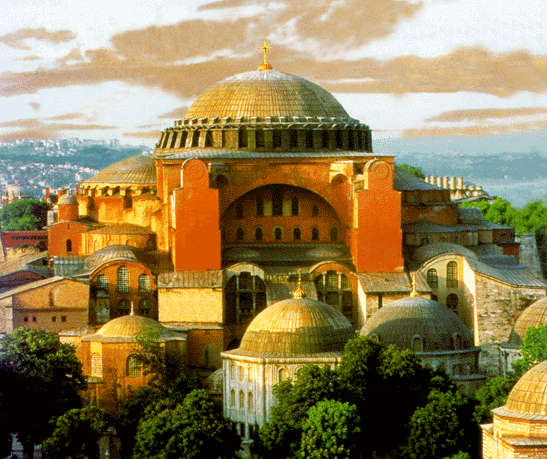CHAPTER I
THE WISDOM OF THE CHURCH SOPHIA
The most magnificent sanctuary of the Eastern Churches is called St Sophia (Holy Wisdom), whereas the most magnificent sanctuaries of the Western Churches are called St Peter's, St Paul's, or St John's, etc. As every hair on our head and every line on the palm of our hand has a certain significance, so these dedications of the Church have doubtless certain significance. And this significance is typical of the religion of the East and the West. Western Christianity, grown upon the soil of a youthful individualism, preferred this or that apostle's personality and dedicated their best temples to him. The aged East, tired of individualistic ambitions, tired of great men, flagellated by the phantom of human greatness, was thirsty for something higher and more solid than any human personality. Adoration of great personalities being the very wisdom of this world, the East stretched its hands to a superhuman ideal, to the Holy Wisdom. It is a psychological fact that youth sees his ideal in personal greatness, progressed age in holiness. The East asked for something more eternal than Peter, Paul or John. There is wisdom, and there is holy wisdom. Philosophical or personal wisdom existed from the beginning of mankind, but Holy Wisdom entered the world with Jesus Christ. Christ was the embodiment of God's wisdom, the very incarnation of Holy Wisdom. This Wisdom stands above all human
wisdom and revives and illuminates it. Holy Wisdom includes the
essential wisdom of Peter, Paul, John, and any other apostle or seer, or any other thing or creature, as the ocean includes the water of many rivers. In the darkest times of dissension, uncertainty or suffering, the Christian East did not rely so much upon the great apostles, either Peter, or Paul, or John, but looked beyond time and space to the Eternal Christ, The Logos of God, and asked for Light. And it looked to Eternity through this church in Constantinople, St Sophia, as the all-embracing and all-reconciling, holy symbol. Whenever Peter, or Paul, or John, or any other apostle, or prophet, became the ground upon which the believers quarrelled, it was in the Holy Wisdom that they sought refuge and healing from their intellectual one-sidedness and ill-will.

Yet if Holy Wisdom has only in the East a magnificent visible symbol, Holy Wisdom is none the less the very foundation, substance and aim of the Western Church as well as of the Eastern, yea of the one, holy Catholic Church. For Christianity had been destined neither for the East alone nor for the West alone, but for the whole globe. And what means the so-much abused word Catholic if not inclusiveness? Even such is, too, the meaning of the Divine wisdom as revealed in Christianity from the beginning.
I will try to show this inclusive wisdom of the Church, revealed from the beginning, Firstly in the Church's Founder, Secondly in the Church's organisation, and Thirdly in the Church's destination.

Нема коментара:
Постави коментар